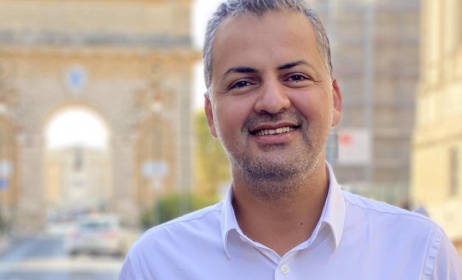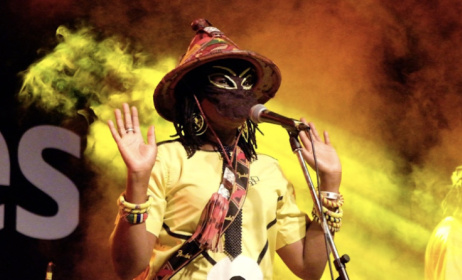Rocky Dawuni talks about his new EP Voice of Bunbon Vol. 1
Rocky Dawuni’s vision for Voice of Bunbon Vol. 1 – his meditative new EP – harks back to the values that inspired his musical journey in the first place: “To present a globalised version of African culture.”
 Rocky Dawuni.
Rocky Dawuni.
It is what informed the conception of his signature ‘Afro Roots’ style, a distinct hybrid of reggae, Afrobeat, highlife and soul. Since 1996, Dawuni's melodic innovation on seven majestic full-length albums has distinguished him as a global pathfinder and advocate. In 2015 it earned him a Grammy nod for Best Reggae Album.
The new eight-track collection, betraying rich charm and prompt truths, honours the northern town he hails from. It emerged from a desire to create music that is deeply rooted in Ghanaian culture yet packaged to appeal to the world.
“My musical career has always been firmly inspired by my upbringing in the royal family of Bunbon and being educated in indigenous ways,” Dawuni says. “This exposure to cultural appreciation has served as an important part of my world view and music.”
Voice of Bunbon Vol. 1 is also testament of his Solomonic beliefs, which, considering what 2020 turned out to be, is particularly beneficial. “We need songs and hymns that can touch our emotional nerve," he says. Musical offerings that serve as timely reminders that “love and hope are an indestructible aspect of the human experience that no amount of fear can take away.”
A good number of the songs on the EP were written during the lockdown in the mountainous town of Aburi, and, as is the case everywhere else, the COVID-19 crisis led Dawuni to ponder fundamental questions like mortality, spirituality and our collective responsibility as guardians of life on the planet. With songs like ‘Ghost Town’, he explores the genesis of the challenges that beset to world today, while still affirming the human spirit’s resilient power and our capacity to overcome adversity.
In the wake of the health crisis, Dawuni noticed an important trend in Ghana: people fled the cities to be with their families, waiting out the pandemic in their ancestral villages. “There were lots of family reconnections happening everywhere,” he says. “It revealed to me the importance of our African cultural traditions becoming the baseline in a time of uncertainty. The timeless value of the family system and the enduring relevance of indigenous ways.
“Many people, including myself, started advocating for the use of traditional and herbal-based remedies, stressing the importance of eating whole foods and making wellness a priority. As a musician observing these ideas beginning to shape people’s mindset inspired me to use traditional music styles in my writing process and pushed me to experiment further with cultural and contemporary styles. Songs like ‘My Baby’ and ‘Woara’ were written with this philosophy.”
On the absence of collaborators on the new EP, Dawuni says: “This was an EP that I felt should flow freely and truthfully from open channels of inspiration without the gimmicks of commercialisation. The freedom to explore a more personal truth that articulates a world in crisis from my perspective. The songs, I felt, did not need too much help to tell that story.”
The musician says he will return to collaborations with his next full-length album, which will drop in 2021 after the release of Voice of Bunbon Vol. 2.



























Commentaires
s'identifier or register to post comments